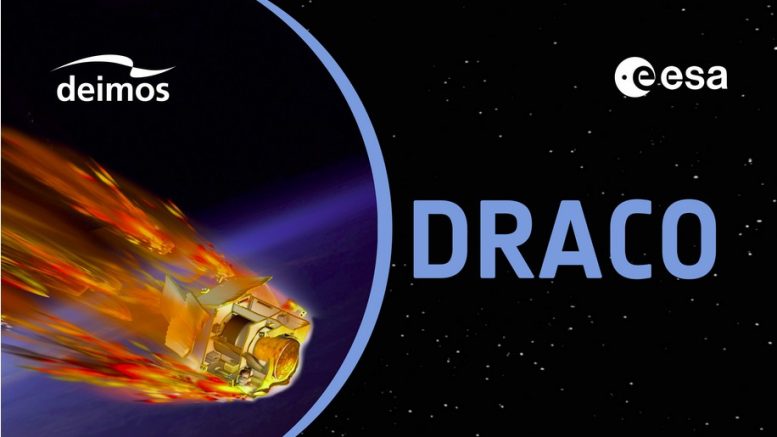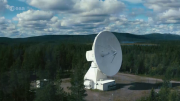ESA awards Deimos €17 Million Contract for Pioneering Space Sustainability Mission “DRACO”
World’s first demonstration of a controlled satellite break-up process
Madrid, 24th September 2024 – The European Space Agency (ESA) has awarded Deimos Space, a leading player in the European space industry, the contract for its DRACO (Destructive Re-entry Assessment Container Object) mission, ultimately worth 17 million euros. The agreement for the first phase of the mission development, worth three million euros, was signed on today. Scheduled for launch in 2026, the mission, using a 150kg satellite, is set to be the world’s first demonstration of a controlled break-up process in the Earth’s atmosphere.
For the development of this first phase, prime contractor Deimos will lead a consortium including Von Karman Institute in Belgium, Fluid Gravity Engineering, Belstead Research, Vorticity and Dial (all in the UK) and Hyperschall Technologie Göttingen from Germany.
The DRACO mission aims to eventually reduce the existing uncertainties in the breakup and demise processes, and to ultimately ensure that satellites completely burn up during re-entry. A complete burn up in the atmosphere assures the safety of people and the integrity of infrastructure and assets on the ground and in airspace.
DRACO’s primary objective is to record the sequence of events during a satellite’s destructive re-entry, with a surviving capsule transmitting detailed and unprecedented data to the ground.
The insights gained from this mission are expected to be instrumental in advancing early fragmentation and design-for-demise (D4D) technologies, which are pivotal to ESA’s Zero Debris approach and the future of sustainable space activities.

Holger Krag, ESA Head of Space Safety, said: “The DRACO mission is part of ESA’s Zero Debris approach. We need to gain more insight into what happens when satellites burn up in the atmosphere as well as validate our re-entry models. The data collected by DRACO will help guide the development of new technologies to build more demisable space systems by 2030. We look forward to making the mission a reality together with Deimos as our prime contractor.”
Simone Centuori, CEO of Deimos, said: “Securing the initial phase of the DRACO contract is a major milestone for Deimos. It reinforces our position as a leader in small satellite development and a key contributor to Europe’s space sector. It also underscores our dedication to innovation and sustainability in space. This mission will provide unprecedented insights into satellite re-entry processes. It will also help paving the way for a safer and greener orbital environment.
“The consortium brings together top expertise from across Europe to ensure the success of this ambitious project. We are honoured to lead this critical mission, and we look forward to working closely with our partners to achieve its objectives.”
Deimos, as the system integrator and prime contractor of the mission, is responsible for mission design and management, systems engineering, platform development and integration, and the ground and user segments. The satellite, also designed by Deimos, will be assembled at Deimos’ facilities in Puertollano (Spain), with contributions from Deimos teams in Portugal, Italy and Romania.
About Elecnor Deimos
Elecnor Deimos, founded in 2001, is a leading European technology group with approximately 500 professionals. Headquartered in Spain and operating through subsidiaries in five countries, Deimos serves a wide range of industries, including space, transport, aeronautics, and maritime. The company is also a trusted partner in delivering comprehensive digital transformation solutions.
In the space sector, Deimos offers end-to-end services, from small satellite design and integration to micro-launcher subsystem development and Earth observation satellite operations. Deimos also provides satellite data and end-user applications, ensuring a full range of solutions for clients.
In addition to its engineering expertise, Deimos delivers operational space and ground infrastructure services, such as satellite tracking and data reception. Through the Deimos Sky Survey (DESS) Center, the company plays a crucial role in Space Safety and Awareness by tracking and cataloging space debris and near-Earth objects, contributing to the sustainability and safety of space activities.
For more information, visit www.elecnor-deimos.com.www.elecnor-deimos.com
About ESA’s Zero Debris Approach
Building on a decade of ESA-wide collaborative work, the Agency has taken the lead in space sustainability by introducing the ‘Zero Debris approach’: ESA’s bold goal to significantly limit the production of debris in Earth and Lunar orbits by 2030 for all future missions, programmes and activities. ESA has updated its debris mitigation requirements and standards that will govern how the Agency’s missions are designed, built, flown and disposed of, but also setting the rules for any company or institution that works with ESA on its missions.
https://www.esa.int/Space_Safety/Clean_Space/ESA_s_Zero_Debris_approach
About DRACO
The main DRACO mission consists in the recording of the destructive re-entry of the spacecraft that will take place in few minutes when the spacecraft will reach 90 km altitude. The spacecraft will heat up to 2000K at 75km ablating and tearing apart the aluminium structure. The Demise Data Collection Unit, protected with a dedicated Thermal Insulation System, will collect the sensor recording up to their ablation or separation from the spacecraft and send the data to the Capsule.
Source: ESA










Be the first to comment on "ESA awards Deimos €17 Million Contract"